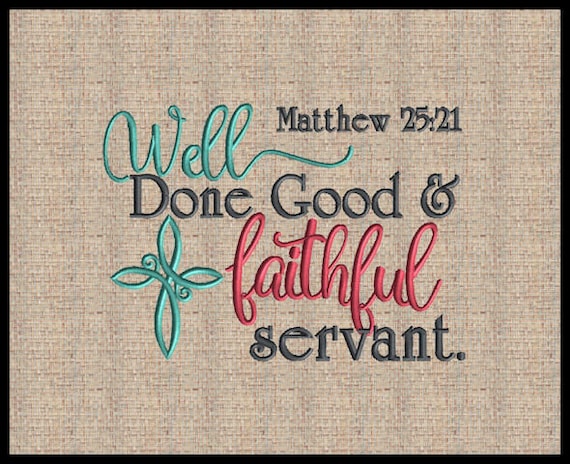


There are three things that stand out in this story of the master, the servants, and the talents.
Scripture well done my good and faithful servant how to#
He was teaching how to live their lives as followers of Jesus, and to continue His work.

He was going away, just like the master in the story. If they were to be launched as the early church, this story was about more than a master and his servants. Throughout this whole chapter, which is part of the Sermon on the Mount, Jesus delved beyond religious rules and traditions to bring heart issues into the light, and this story was no different. Instead, He was always after the heart of those He discipled. Jesus’ character was never to demean, demoralize, or set impossible standards for those He loved. Perhaps we see that others are able to pour large amounts of money into worthy projects, and our offerings, though sacrificial, pale in comparison. Maybe we measure what we do by someone else’s efforts – and ours seem to fall short. When we read the story in Matthew 24:14-30, we may worry that somehow we aren’t doing enough to merit these words spoken by the master. His words were for the heart behind her hard work. His congratulations wasn’t for the amount she raised, though it was significant and took days to raise. His congratulations weren’t for the newspaper photo, because that was never her intent. Later, when the cameras were gone, her dad knelt in front of her. Shelter volunteers invited Jane to help serve lunch and to meet some of the guests at the shelter, and she loved it. A local newspaper picked Jane’s story up as a human-interest piece and accompanied her as she took the money to the local shelter.

She raised a little over $600, which far surpassed the few dollars in her piggy bank. In return, they would pledge a sum that would go wholly to a local homeless ministry and food bank. She explained the need and offered to create a custom picture for them. She also went door to door to speak to close neighbors. Her dad helped her spread the word on social media, but she did all the work. She drew pictures and signed them like a real artist. She loved art, so she purchased art supplies with some of the funds she had saved. When the waiting gets troublesome, Lord, and I am tempted to complain about bad people who get good things, open my eyes to see what you have done for me. Through Jesus Christ we have the down payment on God’s rich blessings of life and joy (Ephesians 1:14)-and the rest will come in God’s good time, when Jesus returns. Good things do happen to people who pay the price of discipleship and patiently wait for the fullness of the blessing. Jesus Christ bought us for a price we are asked to be worth the cost (1 Corinthians 6:20)-and that includes the patience to wait for God’s blessing, whether we wait a day, a year, or forty-five years, as Caleb did. It’s not worth the milk and honey.” (See Numbers 14:1-9.) So God let their whole generation die in the desert.ĭiscipleship has a price: it may cost no less than what our Master paid. In effect, they said, “It would be better to die in the desert or to have stayed in Egypt than to follow God and have to face those giants. Caleb’s generation feared the people of the land more than they feared God. It takes courage to serve God in the world-sometimes more so among God’s own people. Only their children would enter the land. As a result, God made the people wander in the desert for forty years. But God’s people were afraid, so they refused. Forty-five years earlier Caleb and Joshua had encouraged Israel to enter the land of promise to receive their inheritance.


 0 kommentar(er)
0 kommentar(er)
